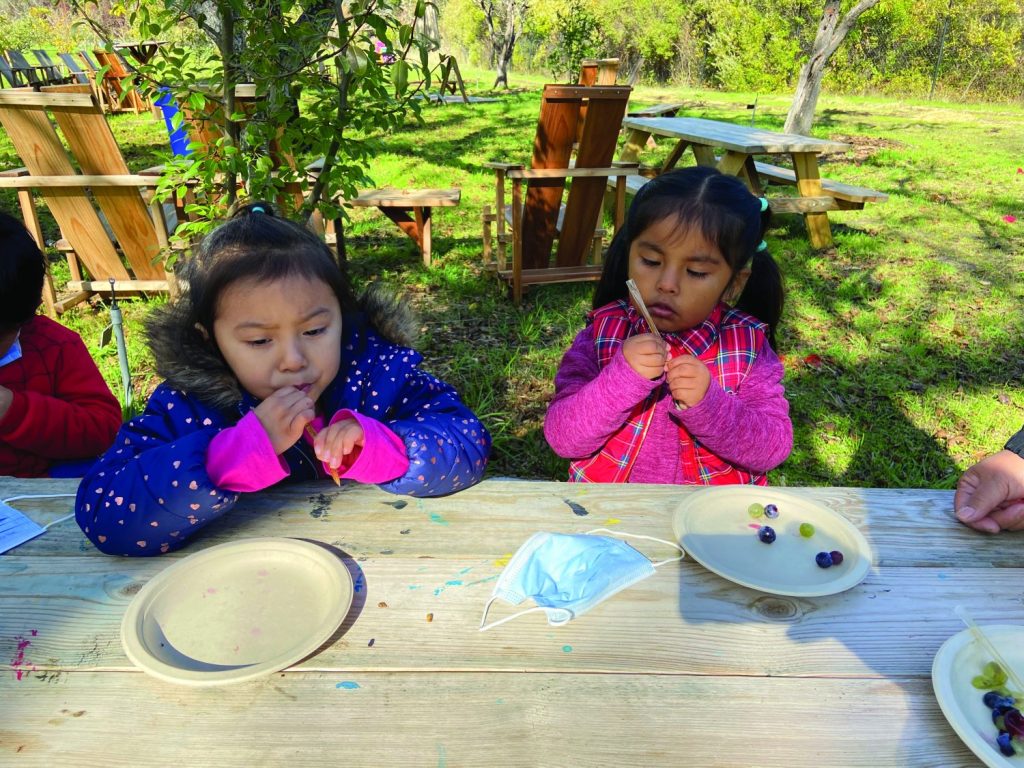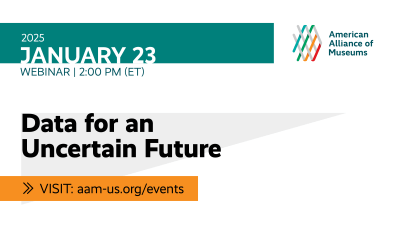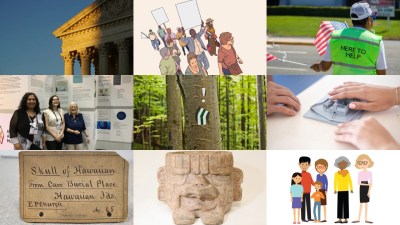
This article originally appeared in Museum magazine’s July/August 2023 issue, a benefit of AAM membership.
Filoli works with preschool programs throughout the year to help young children become comfortable in nature.
Can you remember your first memory of a museum or garden visit?
I have two that were pivotal: a field trip to the Getty Villa garden in Los Angeles, and lying in the grass with my preschool classmates, gazing into a tree blooming with monarch butterflies. Being immersed in nature, gardens, and art, I began to feel a sense of belonging in these places. Filoli’s youth programs aim to build that same sense of belonging by helping children grow comfortable seeking out nature and gardens for moments of respite, creative expression, and social connections.
At Filoli—a historic house with 16 acres of formal gardens on a 654-acre estate on the San Francisco Peninsula with 85 full- and part-time staff members—we continuously balance depth of engagement with the number of people served. When we had to pause our elementary school field trip program in 2020 due to the pandemic, we faced a choice: Do we want to bring back a program that serves 10,000 children but lacks a deep connection, or should we create one that serves fewer people but makes a bigger individual impact?
At the same time, we were brainstorming programming ideas for a grant we received through the International Coalition of Sites of Conscience and the Institute of Museum and Library Services (IMLS) CARES Act Grants for Museums and Libraries program. Through this grant, Filoli received training to create meaningful programs in partnership with marginalized communities experiencing significant cultural, social, and economic impacts of the COVID-19 pandemic. Over nine sessions, we, along with the other grantees, met with community organizations to understand their perspectives and needs and discussed logic models and program ideas for feedback.
In the end, we developed a program model for preschool children centered on Filoli as a place of respite for children and their families. Children ages 3 to 5 visit Filoli three times during the school year in fall, winter, and spring. Filoli reimburses schools for bus transportation. In addition, student families and preschool staff receive a complimentary annual Filoli membership so they can visit on their own.
Working with Community Partners
As we developed the program, we were guided by our diversity, equity, accessibility, and inclusion (DEAI) work and research on the impact of COVID on our community. Accordingly, we focused on the following assumptions:
- Children and their families in marginalized communities have been adversely affected by the pandemic.
- Shelter-in-place orders caused strain on family relationships and limited social and outdoor opportunities.
- Families with essential workers saw each other infrequently because of COVID.
- Filoli is a place where community members have found respite during the pandemic, but ticket prices and lack of public transportation created barriers for some.
- Recent immigrants or BIPOC visitors may not feel comfortable or a sense of belonging in a historically white, affluent space.
Following a tenet of the Sites of Conscience training, we did not want to develop a program based on what we think a community needs. We needed partners to determine if we were on the right track. A board member introduced us to Chinatown Community Children’s Center (CCCC) in San Francisco, which provides bilingual childcare and social services to families that are below the standard income level. Our second partner, Peninsula Family Service (PFS) in San Mateo, also provides early learning programs to low-income families. Both organizations have preschool programs that offer a holistic approach to early childhood education that includes field trips.

We invited teachers and preschool directors from CCCC and PFS to visit Filoli and walk through the grounds and the house, envisioning the experiences they wanted the children to have. We also discussed logistical challenges. Both organizations have existing field trip programs, so the teachers already had elaborate bathroom break plans and knew to take advantage of the soothing bus ride to lull the children to sleep for naptime. This past experience proved crucial in the piloting phase. As we’ve opened up to more preschools, managing these logistics has become a barrier to participation for some preschools new to field trips.
We knew we wanted the children to visit multiple times over the school year so they could experience the garden in different seasons and have time to visit the historic house. Introducing topics in the first visit and revisiting them in subsequent visits also helps build knowledge. The schools were open to this concept and agreed that it would help the children become comfortable in nature and gardens over time. Buses for these repeat visits was cost prohibitive for the schools, so we used IMLS grant funds to pay for them. Filoli continues to fundraise for transportation costs related to the program.
The program aligns with Filoli’s mission to connect our rich history with a vibrant future through beauty, nature, and shared stories. It meets many goals in our Strategic Plan (increased access for families), DEAI Plan (a place of respite for underserved communities), and our Interpretive Plan (telling stories of agriculture and water).
Year-Round Experiences
After a year of testing the program with CCCC and PFS, we now have an engaging menu of activities for every season. Centering the visits around food production and tasting reinforces where our food comes from and that water is essential. We received a curriculum development grant in 2022 for civics education from the Marder-Vaughn Center for Historic Sites Interpretation & Education at the National Trust for Historic Preservation. This allowed us to hire a consultant who helped fine-tune existing curriculum and add activities focused on responsible water use.
Each student receives a free book that reinforces concepts from the field trips and facilitates experiences with adults at home. We offer three books for the teachers to choose from: one on Asian vegetables, a Spanish-language option, and a book on the water cycle.
In fall, we meander through the fruit trees in the orchard and discuss which color of apple is their favorite. We collect fall leaves to weave into an ephemeral mosaic on a loom. We visit the bee hives and learn about pollinators—a topic we revisit in the formal garden during spring when we collect sticks and petals to build ephemeral bug houses for our pollinator friends.
In winter, we learn the phases of the water cycle so children can begin to understand how precious water is in the West. As staff, we happily lose all our inhibitions as we embody clouds and rain to teach the children the water cycle song. We visit the ballroom to see the 100-year-old murals of a lake in Ireland and listen to the soundscape of rain and water sounds.
Filoli can accommodate up to 60 students and teachers, with one staff member from our Learning & Engagement team assigned to every 30 people. We know that weather, potty training, or lack of engagement in a specific activity can upend our plans, so staff stay nimble to adapt to the needs of each school and keep the kids engaged.
To provide students and their families with regular access, we created a new membership level called Community Plus that every participating household receives. CCCC asked Filoli to provide memberships to the teachers as well as the families. They are essential workers, generally receive low wages, and also need places of respite and healing.
Evaluating Our Impact
We regularly ask preschool staff for feedback via phone and in-person conversations after the programs. We initially worried that using words like “evaporation” in songs was too advanced, but the teachers loved introducing new vocabulary. We’ve also learned to reassure teachers that the children do not need to use their quiet voices in the house, and they don’t need to stay on the paths in the garden. We want the children to explore, sing, and fully engage in the space. Oral histories and photos tell us the grandchildren of Filoli’s owners played in the house and garden. Why not let these children do the same to help foster connection and belonging?
We are still working to further break down barriers to access and communication. A number of the children and their families are English language learners, and we ask the preschools for help translating the membership welcome letter into the families’ native languages. We have prioritized hiring bilingual program staff to communicate with children when they visit. We now have a native Spanish speaker on staff, and we would like to offer translation for the Chinese students also.
Foundations and individual funders have responded very positively to Filoli’s model of multivisit youth programs: the John & Marcia Goldman Fund awarded Filoli a $150,000 grant in 2023. Funder generosity has allowed us to expand from serving two preschools in the pilot to 16 in the 2022–23 year, add teen programs, and begin planning for the 2023–2024 school year.
We are currently piloting a similar program model for teens, in partnership with the Boys & Girls Club and multiple programs that help underrepresented students get into and succeed in college. The program goal is similar: to provide opportunities for shared social experiences outside the home and school to build resilience for students and the school community.
“Our children and teachers had a joyful time on the Filoli hands-on field trip,” said the Program Director for the Chinatown Community Children’s Center after one visit. “The garden, veggies, and plants refreshed and revitalized everyone’s mind, soul, and body. We haven’t gone out to enjoy nature as deeply as last Friday.” We hope to hear many more similar comments as we continue this work.
“The program aligns with Filoli’s mission to connect our rich history with a vibrant future through beauty, nature, and shared stories.”
Preschool Program Learning Outcomes
- Children are more connected to where their food comes from when they are exposed to a vegetable garden and fruit trees.
- Children appreciate how precious water is after being introduced to the water cycle and the concept that plants need water to grow our food—a first step toward social responsibility around water use.
- Children learn that there are many types of pollinators and that they play an important role in making our food.
- Children become comfortable learning through observation and using all of their senses to explore nature.








Comments